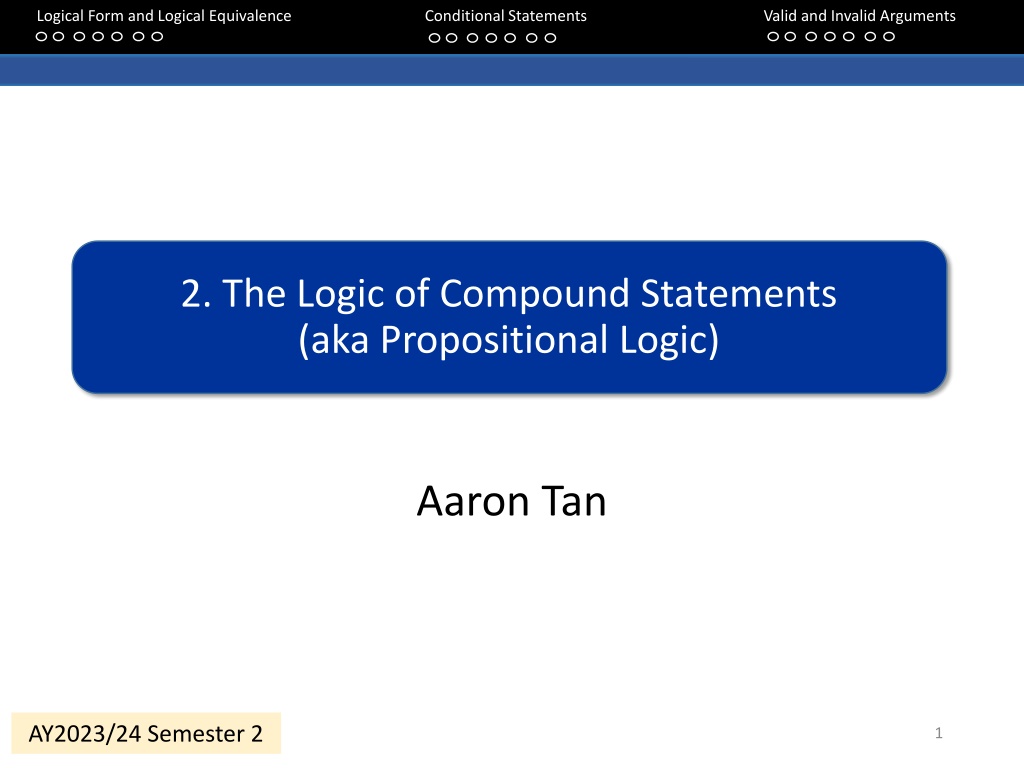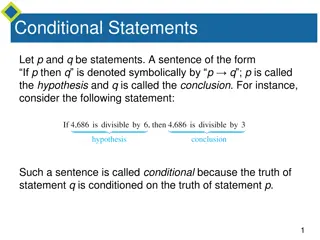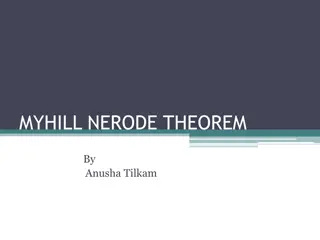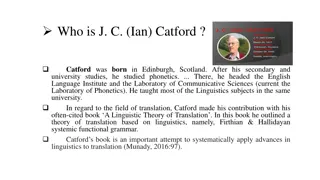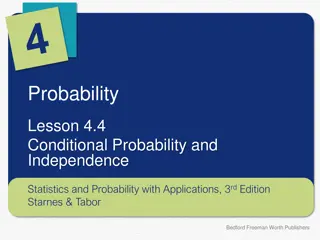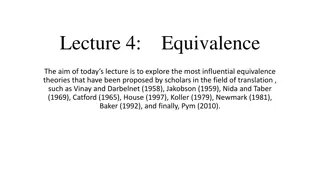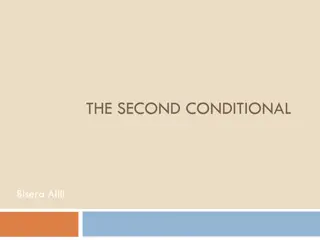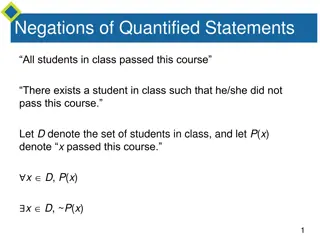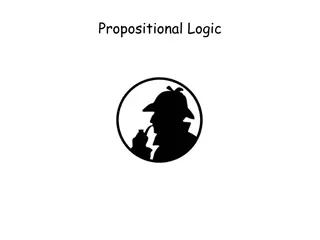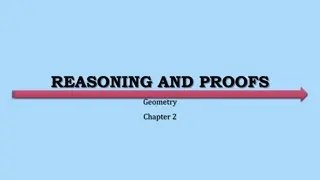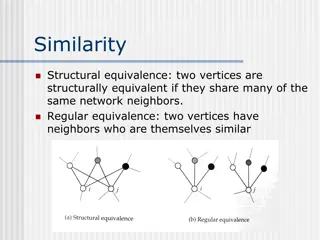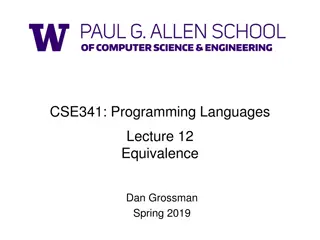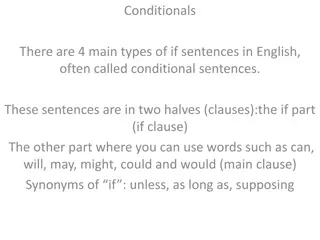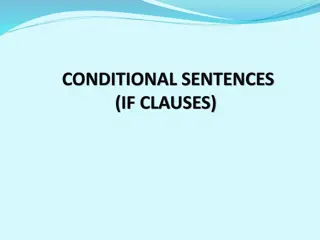Understanding Logical Form and Equivalence in Conditional Statements
Delve into the intricacies of logical form, equivalence, and compound statements in the realm of propositional logic. Explore valid and invalid arguments, conditional statements, and the logic of compound statements with puzzles to sharpen your logical reasoning skills. Unravel scenarios like determining the whereabouts of missing glasses using logical deductions and solve challenging logic puzzles that test your deductive abilities.
Download Presentation

Please find below an Image/Link to download the presentation.
The content on the website is provided AS IS for your information and personal use only. It may not be sold, licensed, or shared on other websites without obtaining consent from the author. Download presentation by click this link. If you encounter any issues during the download, it is possible that the publisher has removed the file from their server.
E N D
Presentation Transcript
Logical Form and Logical Equivalence Conditional Statements Valid and Invalid Arguments 2. The Logic of Compound Statements 2. The Logic of Compound Statements (aka Propositional Logic) Aaron Tan AY2023/24 Semester 2 1
Logical Form and Logical Equivalence Conditional Statements Valid and Invalid Arguments 2. The Logic of Compound Statements 2.1 Logical Form and Logical Equivalence Statements; Compound Statements; Statement Form (Propositional Form) Logical Equivalence; Tautologies and Contradictions 2.2 Conditional Statements Conditional Statements; If-Then as Or Negation, Contrapositive, Converse and Inverse Only If and the Biconditional; Necessary and Sufficient Conditions 2.3 Valid and Invalid Arguments Argument; Valid and Invalid Arguments Modus Ponens and Modus Tollens Rules of Inference Fallacies Reference: Epp s Chapter 2 The Logic of Compound Statements 2
Logical Form and Logical Equivalence Conditional Statements Valid and Invalid Arguments 2. The Logic of Compound Statements At the end of this lecture, you should be able to solve this puzzle: You are about to leave for school in the morning and discover that you don t have your glasses. You know the following statements are true: a. If I was reading the newspaper in the kitchen, then my glasses are on the kitchen table. If my glasses are on the kitchen table, then I saw them at breakfast. I did not see my glasses at breakfast. I was reading the newspaper in the living room or I was reading the newspaper in the kitchen. If I was reading the newspaper in the living room then my glasses are on the coffee table. b. c. d. e. So, where are your glasses? 3
Logical Form and Logical Equivalence Conditional Statements Valid and Invalid Arguments 2. The Logic of Compound Statements Another puzzle! To be given out during lecture. Touted as the logic question that almost everyone gets wrong. 4
Logical Form and Logical Equivalence Conditional Statements Valid and Invalid Arguments 2.1 Logical Form and Logical Equivalence 5
Logical Form and Logical Equivalence Conditional Statements Valid and Invalid Arguments Example If Jane is a math major or Jane is a computer science major, then Jane will take MA1101R. Jane is a computer science major. Therefore, Jane will take MA1101R. If CS1231 is easy or I study hard. ______________, then Therefore, I will get A+ in this course. _____________________. 6
Logical Form and Logical Equivalence Conditional Statements Valid and Invalid Arguments Statements 2.1.1. Statements If Jane is a math major or Jane is a computer science major, then Jane will take MA1101R. Jane is a computer science major. Statements Therefore, Jane will take MA1101R. Definition 2.1.1 (Statement) A statement (or proposition) is a sentence that is true or false, but not both. 7
Logical Form and Logical Equivalence Conditional Statements Valid and Invalid Arguments Statement variables If Jane is a math major or Jane is a computer science major, then Jane will take MA1101R. Jane is a computer science major. Therefore, Jane will take MA1101R. If p or q, then r. q. Therefore, r. Statement variables See Definition 2.1.5 Statement Form. 8
Logical Form and Logical Equivalence Conditional Statements Valid and Invalid Arguments Compound Statements 2.1.2. Compound Statements Logical connectives: also and or ~ Not/negation Truth tables: p q T p q T p q p q p ~p T T T T T F F T T F F T F F T F F T T T F F F F F F 9
Logical Form and Logical Equivalence Conditional Statements Valid and Invalid Arguments Compound Statements: Negation, Conjunction, and Disjunction Definition 2.1.2 (Negation) If p is a statement variable, the negation of pis not p or it is not the case that p and is denoted ~p. Definition 2.1.3 (Conjunction) If p and q are statement variables, the conjunction of p and qis p and q , denoted p q. Definition 2.1.4 (Disjunction) If p and q are statement variables, the disjunction of p and qis p or q , denoted p q. 10
Logical Form and Logical Equivalence Conditional Statements Valid and Invalid Arguments Compound Statements: Order of Operations Order of operations: ~ is performed first and are coequal in order of operation ~p q (~p) q p q r Ambiguous Use parentheses to override or disambiguate order of operations ~(p q) Negation of p q (p q) r p (q r) Unambiguous In some other modules, different symbols are used, such as for conjunction and + for disjunction in CS2100. Others use or for negation. In CS2100, conjunction is performed before disjunction. We shall follow the symbols and order of operations here. 11
Logical Form and Logical Equivalence Conditional Statements Valid and Invalid Arguments Compound Statements: Quick Quiz Given: h= It is hot s= It is sunny Write logical statements for the following: a. It is not hot but it is sunny. b. It is neither hot nor sunny. 12
Logical Form and Logical Equivalence Conditional Statements Valid and Invalid Arguments Statement Form 2.1.3. Statement Form (Propositional Form) Examples: ~p q (p q) ~(p q) (p q) r Definition 2.1.5 (Statement Form/Propositional Form) A statement form (or propositional form) is an expression made up of statement variables and logical connectives that becomes a statement when actual statements are substituted for the component statement variables. Which of the following are statements? (A) 2 + 3 = 9 (C) 3 + ? = 9 (D) 2? = ?2 (B) 5 > 2 13
Logical Form and Logical Equivalence Conditional Statements Valid and Invalid Arguments Evaluating the Truth of Compound Statements Construct the truth table for this statement form: (p q) ~(p q) p q p q ~(p q) (p q) ~(p q) p q T T T T T F T F T F F T F F F F (p q) ~(p q) is also known as exclusive-or (why?) p q p XOR q (Sometimes denoted as or . We don t use these notations and XOR in CS1231S.) 14
Logical Form and Logical Equivalence Conditional Statements Valid and Invalid Arguments Logical Equivalence 2.1.4. Logical Equivalence (1) Dogs bark and cats meow. (2) Cats meow and dogs bark. If (1) is true, it follows that (2) must also be true. On the other hand, if (1) is false, it follows that (2) must also be false. (1) and (2) are logically equivalent statements. 15
Logical Form and Logical Equivalence Conditional Statements Valid and Invalid Arguments Logical Equivalence Definition 2.1.6 (Logical Equivalence) Two statement forms are called logically equivalent if, and only if, they have identical truth values for each possible substitution of statements for their statement variables. The logical equivalence of statement forms P and Q is denoted by P Q. a b T b a T Example: a T b T (a b) and (b a) always have the same truth values, hence they are logically equivalent. T F F F F F T F F F F F 16
Logical Form and Logical Equivalence Conditional Statements Valid and Invalid Arguments Logical Equivalence: Double Negative Property Double negation: ~(~p) p p ~p ~(~p) T F F T T F 17
Logical Form and Logical Equivalence Conditional Statements Valid and Invalid Arguments Logical Equivalence: Showing Non-equivalence To show that statement forms P and Q are not logically equivalent, there are 2 ways: Truth table find at least one row where their truth values differ. Find a counter example concrete statements for each of the two forms, one of which is true and the other of which is false. 18
Logical Form and Logical Equivalence Conditional Statements Valid and Invalid Arguments Logical Equivalence: Showing Non-equivalence Show that the following 2 statement forms are not logically equivalent. ~(p q) ~p ~q Truth table method: p q T ~(p q) F ~p ~q F p q ~p ~q T T F F T F F T F T F F F T F T T F T F F T T F T 19
Logical Form and Logical Equivalence Conditional Statements Valid and Invalid Arguments Logical Equivalence: Showing Non-equivalence Show that the following 2 statement forms are not logically equivalent. ~(p q) ~p ~q Counter-example method: Let pbe the statement 0 < 1 and qthe statement 1 < 0 . Not the case that both 0<1 and 1<0 which is TRUE. ~(p q) ~p ~q Not 0<1 and not 1<0 which is FALSE. 20
Logical Form and Logical Equivalence Conditional Statements Valid and Invalid Arguments Logical Equivalence: De Morgan s Laws De Morgan s Laws: ~(p q) ~p ~q Can be extended to more than two variables. ~(p q) ~p ~q Write negations for each of the following: a. John is 6 feet tall and he weighs at least 200 pounds. John is not 6 feet tall or he weighs less than 200 pounds. b. The bus was late or Tom s watch was slow. The bus was not late and Tom s watch was not slow. or Neither was the bus late nor was Tom s watch slow. 21
Logical Form and Logical Equivalence Conditional Statements Valid and Invalid Arguments Tautologies and Contradictions 2.1.5. Tautologies and Contradictions Definition 2.1.7 (Tautology) A tautology is a statement form that is always true regardless of the truth values of the individual statements substituted for its statement variables. A statement whose form is a tautology is a tautological statement. Definition 2.1.8 (Contradiction) A contradiction is a statement form that is always false regardless of the truth values of the individual statements substituted for its statement variables. A statement whose form is a contradiction is a contradictory statement. 22
Logical Form and Logical Equivalence Conditional Statements Valid and Invalid Arguments Tautologies and Contradictions Logical equivalence involving tautologies and contradictions Example: If t is a tautology and c is a contradiction, show that: p t p p c c and p t T p c F p t c T T F F T F F F As t and c (used in the textbook) are hard to distinguished from statement variables, we will use true and false instead. 23
Logical Form and Logical Equivalence Conditional Statements Valid and Invalid Arguments Summary of Logical Equivalences 2.1.6. Summary of Logical Equivalences Theorem 2.1.1 Logical Equivalences Given any statement variables p, q and r, a tautology true and a contradiction false: p q q p p q q p 1 Commutative laws p q r (p q) r p (q r) p (q r) (p q) (p r) p q r (p q) r p (q r) p (q r) (p q) (p r) 2 Associative laws 3 Distributive laws p true p p false p 4 Identity laws p ~p true p ~p false 5 Negation laws ~(~p) p 6 Double negative law 24
Logical Form and Logical Equivalence Conditional Statements Valid and Invalid Arguments Summary of Logical Equivalences 2.1.6. Summary of Logical Equivalences Theorem 2.1.1 Logical Equivalences (continue) Given any statement variables p, q and r, a tautology true and a contradiction false: p p p p p p 7 Idempotent laws p true true p false false 8 Universal bound laws ~(p q) ~p ~q ~(p q) ~p ~q 9 De Morgan s laws p (p q) p p (p q) p 10 Absorption laws Negation of true and false ~true false ~false true 11 25
Logical Form and Logical Equivalence Conditional Statements Valid and Invalid Arguments Simplifying Statement Forms: Quick Quiz Use the laws in Theorem 2.1.1 to verify the following logical equivalence: ~(~p q) (p q) p ~(~p q) (p q) (~(~p) ~q) (p q) (De Morgan s) Remember to cite the law in every step in your workings. 26
Logical Form and Logical Equivalence Conditional Statements Valid and Invalid Arguments 2.2 Conditional Statements 27
Logical Form and Logical Equivalence Conditional Statements Valid and Invalid Arguments Conditional Statements 2.2.1. Conditional Statements If Jane is a math major or Jane is a computer science major, then Jane will take MA1101R. hypothesis conclusion If 4,686 is divisible by 6, then 4,686 is divisible by 3. Conditional statement p q If p then q 28
Logical Form and Logical Equivalence Conditional Statements Valid and Invalid Arguments Conditional Statements Logical connective: p q T Truth values: p T q T T F F if-then/implies F F T F T T Definition 2.2.1 (Conditional) If p and q are statement variables, the conditional of q by pis if p then q or p implies q , denoted p q. It is false when p is true and q is false; otherwise it is true. We called p the hypothesis (or antecedent) of the conditional and q the conclusion (or consequent). 29
Logical Form and Logical Equivalence Conditional Statements Valid and Invalid Arguments Conditional Statements A conditional statement that is true by virtue of the fact that its hypothesis is false is often called vacuously true or true by default. If you show up for work Monday morning, then you will get the job is vacuously true if you do NOT show up for work Monday morning. p q p q T T T T F F F T T F F T In general, when the if part of an if-then statement is false, the statement as a whole is said to be true, regardless of whether the conclusion is true or false. 30
Logical Form and Logical Equivalence Conditional Statements Valid and Invalid Arguments Conditional Statements: Example #1 Example #1: A Conditional Statement with a False Hypothesis If 0 = 1, then 1 = 2 31
Logical Form and Logical Equivalence Conditional Statements Valid and Invalid Arguments Conditional Statements: Order of Operations Order of operations: and or ~ not if-then/implies Coequal in order Performed first Performed last 32
Logical Form and Logical Equivalence Conditional Statements Valid and Invalid Arguments Conditional Statements: Example #2 Example #2: Truth Table for p ~q ~p (p (~q)) (~p) p ~q ~p conclusion hypothesis p ~q p ~q ~p p T q T ~p ~q F F T T F T F T T T F T T F F F T F 33
Logical Form and Logical Equivalence Conditional Statements Valid and Invalid Arguments Conditional Statements: Example #3 Example #3: Show that (p r) (q r) p q r p q T T T T T T F F p r q T F T F T T T T r T F T T T F T T p q r (p r) (q r) p q r T T T T T F T T F F T F F T T F T F F F T F F F 34
Logical Form and Logical Equivalence Conditional Statements Valid and Invalid Arguments Representation of If-Then as Or: Implication Law 2.2.2. Representation of If-Then as Or: Implication Law Rewrite the following statement in if-then form: Either you get to work on time or you are fired. Let ~pbe You get to work on time and qbe You are fired . ~p q Also, pis You do not get to work on time . If you do not get to work on time, you are fired. p q 35
Logical Form and Logical Equivalence Conditional Statements Valid and Invalid Arguments Representation of If-Then as Or: Implication Law p q T ~p q T p q p q T T T T T F F T F F ~p q T F F F T F T T F F T T Implication law p q 36
Logical Form and Logical Equivalence Conditional Statements Valid and Invalid Arguments Negation of a Conditional Statement 2.2.3. Negation of a Conditional Statement In previous slide, we have shown the Implication Law p q ~p q Hence, negation of a conditional statement: ~(p q) ~(~p v q) ~(~p) ~q p ~q Implication law De Morgan s law Double negation law ~(p q) p ~q 37
Logical Form and Logical Equivalence Conditional Statements Valid and Invalid Arguments Negation of a Conditional Statement: Quick Quiz Write negation for each of the following statements: a. If my car is in the repair shop, then I cannot get to class. b. If Sara lives in Athens, then she lives in Greece. 38
Logical Form and Logical Equivalence Conditional Statements Valid and Invalid Arguments Contrapositive 2.2.4. Contrapositive of a Conditional Statement Definition 2.2.2 (Contrapositive) The contrapositive of a conditional statement of the form if p then q is if ~q then ~p Symbolically, The contrapositive of p q is ~q ~p. p q ~q ~p contrapositive 39
Logical Form and Logical Equivalence Conditional Statements Valid and Invalid Arguments Contrapositive: Quick Quiz Write each of the following statements in its equivalent contrapositive form: a. If Howard can swim across the lake, then Howard can swim to the island. b. If today is Easter, then tomorrow is Monday. 40
Logical Form and Logical Equivalence Conditional Statements Valid and Invalid Arguments Converse and Inverse 2.2.5. Converse and Inverse of a Conditional Statement Definition 2.2.3 (Converse) The converseof a conditional statement if p then q is if q then p Symbolically, The converse of p q is q p. Definition 2.2.4 (Inverse) The inverseof a conditional statement if p then q is if ~p then ~q Symbolically, The inverse of p q is ~p ~q. 41
Logical Form and Logical Equivalence Conditional Statements Valid and Invalid Arguments Converse and Inverse p q Conditional statement: q p ~p ~q inverse converse 42
Logical Form and Logical Equivalence Conditional Statements Valid and Invalid Arguments Converse and Inverse: Quick Quiz Write the converse and inverse of the following statements: a. If Howard can swim across the lake, then Howard can swim to the island. If Howard can swim to the island, then Howard can swim across the lake. Converse: Inverse: b. If today is Easter, then tomorrow is Monday. Converse: Inverse: 43
Logical Form and Logical Equivalence Conditional Statements Valid and Invalid Arguments Conditional statement and its Contrapositive, Converse and Inverse p q ~q ~p contrapositive conditional statement q p ~p ~q inverse converse Note that: p q q p 44
Logical Form and Logical Equivalence Conditional Statements Valid and Invalid Arguments Only If and the Biconditional 2.2.6. Only If and the Biconditional To say p only if q means that p can take place only if q takes place also. That is, if q does not take place, then p cannot take place. Another way to say this is that if p occurs, then q must also occur (using contrapositive). Definition 2.2.5 (Only If) If p and q are statements, p only if q means if not q then not p or ~? ~? Or, equivalently, if p then q or ? ? 45
Logical Form and Logical Equivalence Conditional Statements Valid and Invalid Arguments Only If : Quick Quiz Rewrite the following statement in if-then form in two ways, one of which is the contrapositive of the other. John will break the world s record only if he runs the mile in under four minutes. If John does not run the mile in under four minutes, then John will not break the world s record. Version 1: Version 2: 46
Logical Form and Logical Equivalence Conditional Statements Valid and Invalid Arguments Only If and the Biconditional Definition 2.2.6 (Biconditional) Given statement variables p and q, the biconditional of p and qis p if, and only if, q and is denoted p q. It is true if both p and q have the same truth values and is false if p and q have opposite truth values. The words if and only if are sometimes abbreviated iff. p q T p q p q T T T F F T F F F F T 47
Logical Form and Logical Equivalence Conditional Statements Valid and Invalid Arguments Only If and the Biconditional p q (p q) (q p) p q q T F p T T p q T F (p q) (q T F p) p q T T T F F T T F F F F F T T T T 48
Logical Form and Logical Equivalence Conditional Statements Valid and Invalid Arguments Only If and the Biconditional Order of operations: and or ~ not if and only if if-then/implies Coequal in order Coequal in order Performed first Performed last 49
Logical Form and Logical Equivalence Conditional Statements Valid and Invalid Arguments Necessary and Sufficient Conditions 2.2.7. Necessary and Sufficient Conditions Definition 2.2.7 (Necessary and Sufficient Conditions) If r and s are statements, r is a sufficient condition for s means if r then s or ? ? r is a necessary condition for s means if not r then not s or if s then r or ? ? To say r is a sufficient condition for s means that the occurrence of r is sufficient to guarantee the occurrence of s. To say r is a necessary condition for s means that if r does not occur, then s cannot occur either: The occurrence of r is necessary to obtain the occurrence of s. 50
